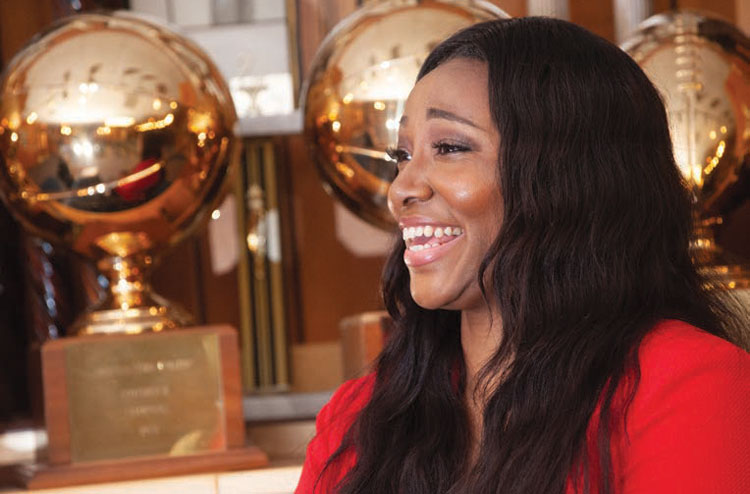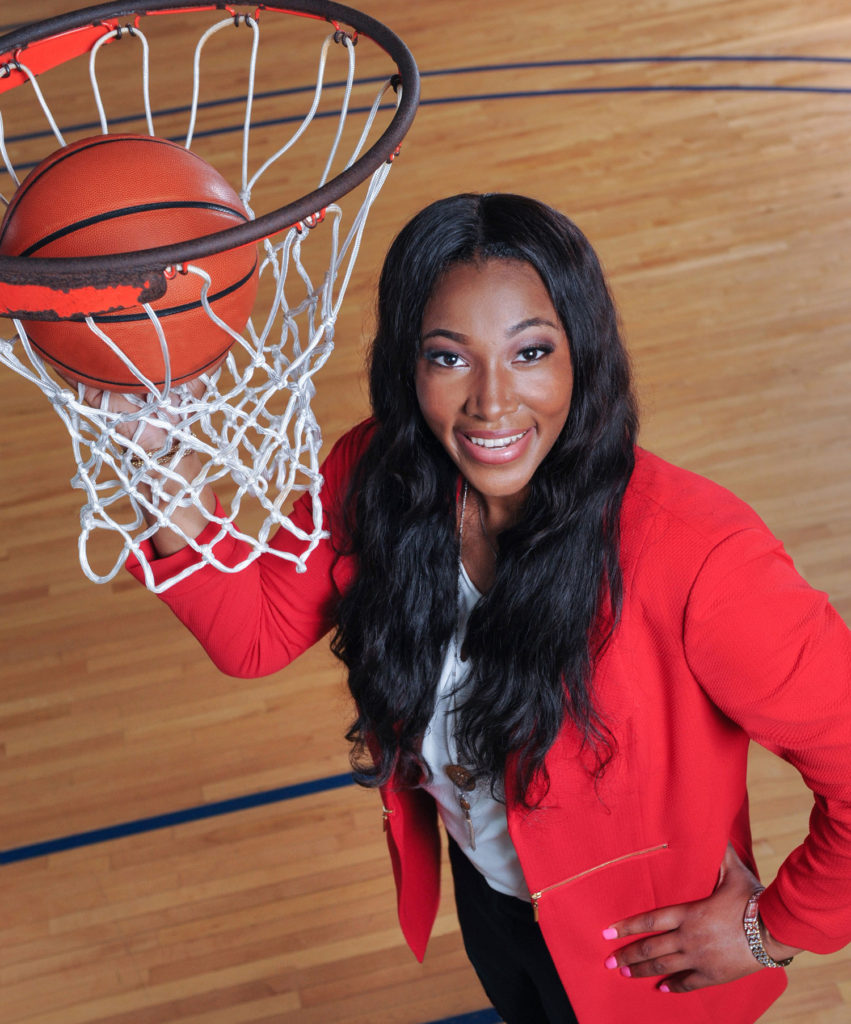By KATIE EUBANKS
Juanita Ward
On hoop dreams, faith and miracles
Juanita Ward was about 12 years old when her grandmother collapsed.
“She was bringing me a little (chocolate) cake she had made for my birthday,” Juanita says. “She was saying, ‘Happy birthday, little Juanita!’ On her last step to me, the cake fell, and she fell (into my arms).”
But Mama ‘Nita didn’t die that day. Despite being told Alzheimer’s would kill her by 75, she was well into her 80s and had defied that prognosis — just as earlier in life she’d defied the Jim Crow South. Her husband was black and Native American, and she was white and Native American.
That courage passed on to Mama ‘Nita’s granddaughter, along with the name Juanita.
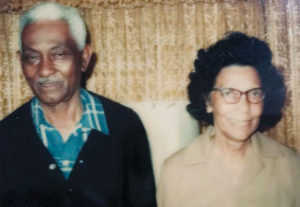
It was hard for Juanita’s paternal grandparents, Joseph and Juanita (aka Mama ’Nita) to be seen together in public. Joseph was black and Native American, and Mama ’Nita was white and Native American.
Meanwhile, little Juanita and her four older siblings had seen their parents endure their own hardships. The family struggled financially when Juanita was a kid. But instead of complaining, Mary and Thomas Ward prayed.
“As a child, you’re seeing this, and you’re like, ‘Man, they’re not giving up. And we don’t have lights. We don’t have food to eat. And they’re not giving up,’” Juanita recalls. “And I just could never see myself having that give-up mentality.”
The Wards lived in Bolton, in Hinds County. “I think now (the population there is) 538,” Juanita says.
At one point the house didn’t have central heat, and she fell asleep on a kerosene heater. Her parents smelled something burning, ran into the room … and today she pulls up her jacket sleeve to reveal a scar running the length of her forearm.
“That’s a reminder of why I wanted better,” she says.
“I really felt the need to set goals at a young age. I just knew being in a small town with one (stop)light, I wanted better, and I wanted my parents to be proud.”
Standing on the Word
Her father, Thomas Ward, played semipro basketball. But when Juanita was little, he got into a motorcycle wreck.
He couldn’t walk, and doctors said he’d be paralyzed from the hips down. At first, he listened to them.
Juanita tells of the day Mama ‘Nita brought a minister to the house, not too long after Thomas’ initial hospital stay: “Dad was wrapped up in bed with all these things stuck in him.” His mother had to pester him three times before he finally got into his wheelchair and wheeled himself out to meet with the minister.
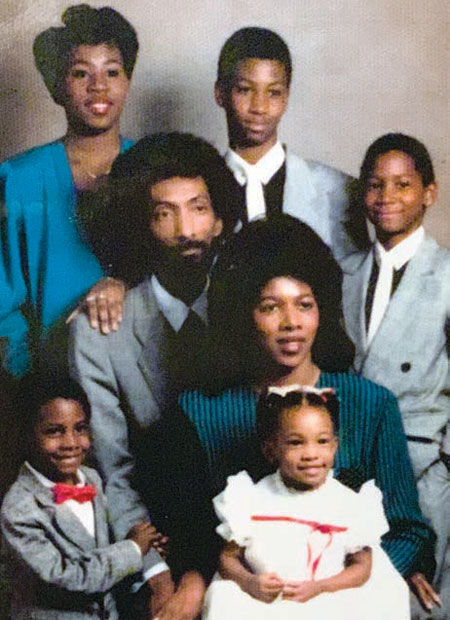
The Ward family. Clockwise from top left: Juanita’s sister Charlotte, brothers Jerod and Joseph, Juanita in mom Mary’s lap, Thomas II, and dad Thomas.
The minister asked Thomas if he believed God could heal him. He said he did. They kept talking, and eventually the minister told him to repeat the name of Jesus aloud. Thomas did so — “Jesus, Jesus, Jesus” – until pretty soon he was shouting.
Then before he knew it, he was standing up.
Then he was jumping.
Thomas’ loved ones cheered and cried. They were witnessing a miracle.
A week later, he walked into his doctor’s office.
His recovery wasn’t over. “There were times when he thought he couldn’t do it because the pain was so excruciating,” Juanita says. “And there were times when he did sit down. But one thing I remember him telling me was that he kept telling himself, he can do it, he can do it. He was doing it for his kids, and he knew God had delivered him.”
Thomas’ pastor told him to call on the name of Jesus when the pain hit — to say, “I’m healed in Jesus’ name.” Whenever Thomas did that, the pain went away.
“That allowed us to see that there was power in the name of Jesus, and there’s also power in our words,” Juanita says.
The scripture Thomas stood on was Mark 11:23-25, which says if we have faith, our prayers can move mountains.
“If my father hadn’t persevered,” Juanita says – she becomes emotional, clears her throat — “things would be different. I might’ve been a kid without a dad to play with.
“His request to God was, ‘If You heal me, I’ll teach my kids everything I know about life and Your words, and I’ll teach them the game (of basketball).’”
Which of course he did.
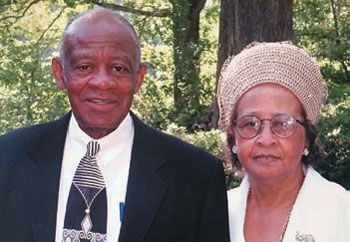
Juanita’s aunt and uncle Kay and Titus
Saunders. Kay taught English and Titus was a school principal. They made a huge impact on Juanita’s life and are part of the reason she loves coaching at schools.
Compared to Thomas’ accident, Juanita’s doesn’t sound so bad: In third grade, her school bus wrecked, and her knee went through the metal part of the seat in front of her.
She’d been playing basketball since age 3, but “the doctors told my parents I could probably hang it up, as far as ever playing sports. (My mother) said, ‘Not so. I know a man named Jesus, and my baby’s leg is going to be healed. We appreciate the report but we don’t receive it.’”
Juanita made a full recovery, and didn’t exactly take it easy while using crutches.
“I wouldn’t sit down during recess … The teacher called my parents, and when they asked me why, I told them a boy had challenged me and said I couldn’t beat him on my crutches.”
That was not the last time she would go toe to toe with a boy. She and her siblings turned everything into a competition, racing each other to their mom when she got home from work. Juanita and her brother Joseph constantly played one-on-one basketball.
“I had to beat him. For me, it was a win-win situation, because I was playing against a boy (and getting better). When I finally did beat him, I didn’t play him again.”
No, she just turned into a 6-foot-tall beast who played all positions.
From All-American to international
From seventh through 12th grade, Juanita stayed with her grandmother.
“That was my choice. I had to make sure my heart was OK,” Juanita says. “I called her my heart … We had the best naps.”
Meanwhile, Juanita started playing high-school ball. Her mother, whom she describes as “a loving fireball,” was her biggest cheerleader. “She would come into the locker room at Callaway (High School in Jackson) and her thing every single time (was), ‘Go for the gold, baby! Go for the gold!’ And I’m like, ‘Mom, stop! That’s enough!’”

Juanita fidgets as she lists off some of her accolades:
“I was highly recruited in high school. I was the No. 1 player in the country.” (She humbly mumbles this phrase, and I have to ask her to repeat it.)
“My jersey number, 15, was retired at Callaway. I was inducted into their hall of fame. Coming out of high school, I was the first female from Mississippi to be a McDonald’s All-American, nominated for the Naismith (National) Player of the Year award.”
She doesn’t reveal much more before saying, “OK, I can’t do this anymore. Can I just send you my bio?”
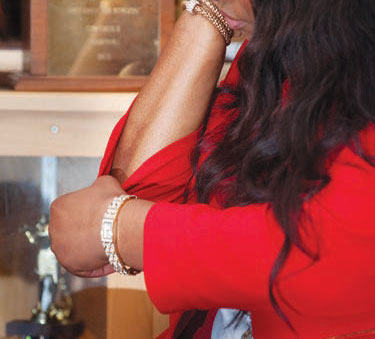
Juanita shows the scar she got from falling asleep on a kerosene heater when she was a kid, when her home didn’t have central heat.
After high school, Juanita played for Syracuse University, two years with the WNBA’s Tulsa Shock and five years with other professional teams in Bulgaria, Ukraine, Israel and the Czech Republic.
“It’s tougher (overseas),” she says. “The fans are throwing things, and some of the things they say (and) write on their signs — sometimes it’s a good thing you don’t know what they’re saying.
“And a legit foul here is nothing over there.”
She also was told to tuck her small gold cross necklace into her shirt, “because either I’d get fined or people would try to hurt me. But I would rather get hurt dying for Christ than tuck Him away.”
The necklace stayed put, with no negative consequences.
“My most important thing (while playing professionally) was to stand on what I knew was right. Every time I would kneel down and pray, whether on the floor or blessing my food, or just telling someone Jesus loves them, it wasn’t a popular thing to do. But I figured if I don’t stand for something, I’ll fall for anything.
“And anytime I did an interview, I spoke about Jesus Christ. Lots of people speak about God, but God could be anything … I don’t want to be the type of person that don’t give the praise to the Most High God.”
Out of a clear blue sky
On November 15, 2011, Juanita Skyped her parents from Sofia, Bulgaria. She asked about Mama ‘Nita, and Thomas said she’d returned to the hospital — she’d been ill — but was expected to make a full turnaround.
“After the call, I walked over toward the window, and for whatever reason, it was the bluest I had ever seen the sky … I was telling God thank You, thank You for having me here, thank You for this job, for this new team, for this opportunity.”
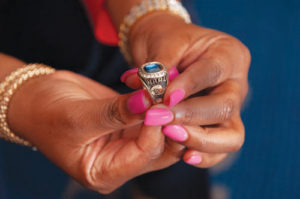
Juanita’s 2012 championship ring from Ukraine, which has the engraving, “R.I.P. Mama ‘Nita,” on the inside.
A few hours later, “I got the text from Dad — and he didn’t know how to text. But he texted this day.”
Mama ‘Nita had died at 98 years old, a full two decades longer than she’d been expected to live.
“I had never heard the earth become so silent as that day,” Juanita says. She was in shock.
After sitting and staring at that sky for an hour, she spoke with other family members — and then her translator.
“I said, ‘Get me a flight out of here or I’m not coming back. If I can’t get home to see my grandmother, I don’t want to play basketball anymore.’”
Juanita flew home the next day.
“I went to the funeral home and was trying to act tough. I went to the freezers where she was, kissed her on the forehead, told her I was proud of her, how much she meant to me. She had to endure a lot.”
Before she ever fought Alzheimer’s, Mama ‘Nita fought for her family’s rights: Decades earlier, a bus driver had asked the light-skinned woman, who was with her dark-skinned son, “What are you doing with that boy?” (“Only there was another word in front of ‘boy,’” Juanita says.) The driver told Mama ‘Nita he would have to sit in the back. She responded, “You don’t tell me what to do with my son,” and they both sat up front.
In 2012, Juanita’s Ukraine team won a championship. The inside of her championship ring is engraved with the words “R.I.P. Mama ‘Nita.”
A player-coach and prophecy
Starting in high school, Juanita coached summer teams in Mississippi, boys and girls from 14 to 17 years old.
She says other states had more male teams coached by women, and admits, “I guess you could say I was breaking barriers and breaking norms … And then when you beat (male coaches), it’s an even bigger deal.”
But she just loved the kids, of both genders, and wanted to give them the same training she had received, she says.
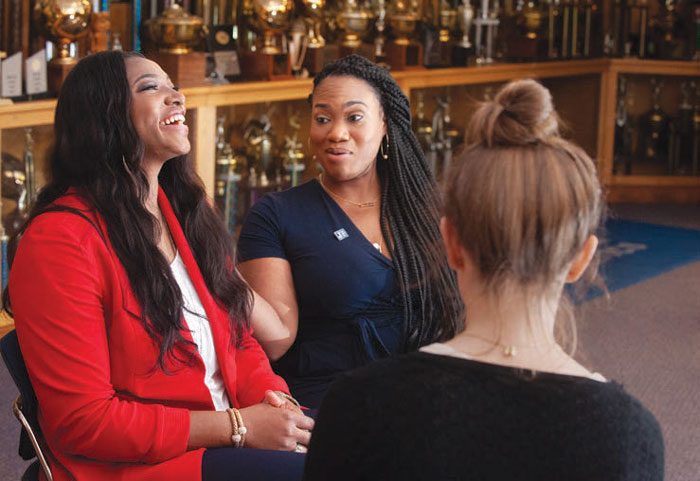
Juanita is the new assistant women’s basketball coach at Jackson State University, where she coaches under Head Coach Tomekia Reed (right).
“The biggest thing for me was seeing that light(bulb) go off when they get it.”
Juanita might not have known it, but her summer gig was preparing her for life after professional basketball. She had asked God to let her play until she was 84. “But later I realized I wasn’t specific. I didn’t say professionally.”
In 2013, she was about to go back overseas when her pastor prayed and prophesied over her at church. “She said I wasn’t going to be playing ball (professionally) the following year,” Juanita recalls.
“My dad always said when you get a prophetic word, put it on the shelf and (see if it happens). Well I think I put this one WAY up on the shelf.”
But by the time Juanita signed a contract to coach girls’ basketball at Jackson Prep in 2014, she was willing to change direction, despite knowing she could’ve played overseas again.
“(Then) it finally hits me: I’m not going to be playing professional ball next year. And I remember Proverbs 3:5-6, ‘Trust in the Lord with all your heart and lean not on your own understanding. In all your ways acknowledge Him, and He will direct your paths.’” (She’d recently read the book of Proverbs at Thomas’ urging.)
“So I’m crying, signing the contract, and Mom asks me, ‘Why are you crying?’ ‘Because I trust God!’ ‘So are those happy tears?’ ‘I don’t know!’ And Mom and Dad are laughing at me.”
Another fact that hit her: She’d told her parents she wanted to see Israel before her professional days were over, and she’d done it. Everything was lined up.
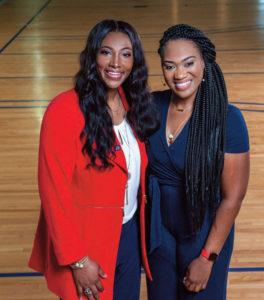
Lady Tigers Head Coach Tomekia Reed, right, recruited Juanita as a player right out of high school, but Juanita wound up elsewhere. Now she works with Tomekia as assistant coach.
After coaching the girls’ team at Prep from 2014-2017 and at Hartfield Academy from 2017-2019, now Juanita is the new assistant women’s basketball coach at Jackson State University. It’s her first time coaching college ball, and she is excited for the adventure.
Back when Lady Tigers Head Coach Tomekia Reed was assistant coach, she recruited Juanita as a player. But Juanita wound up elsewhere. Then when Tomekia got the promotion last year, “I wanted (Juanita) on my staff,” she says. “She was on my short list.”
Tomekia says that beyond Juanita’s obvious qualifications as a player and coach, her “God-fearing personality” and loving nature were crucial for the team — and for Tomekia herself.
“When I lost my father, she would send me devotionals, songs,” Tomekia says.
Another perk of having Juanita as a colleague? She’s a clean freak.
“One day I came into the office and my bathroom had been mopped,” Tomekia recalls. “I thought, ‘Man, the janitors are really doing their job today!’ Then I walked around the corner, and she was the one mopping … She’s just servant-hearted.”
Juanita is grateful for her head coach, too.
“It’s a blessing that I get to sit up under her, not only as a coach but as a leader in Christ.”
Juanita says she strives to create a family atmosphere with her players, whether it’s on a summer team, a high-school team or now at JSU.
In one instance, the word “family” became a bit more literal: One of her former boy players had a baby girl and asked Juanita to be her godmother. “She is the star in my eye,” Juanita says.
Another time, she noticed one of her boy players showing up drenched in sweat every day. He said it was nothing, but she found out he was walking to practice – four to five hours one way. So Juanita started driving him.
“I get choked up,” she says, again clearing her throat and taking a breath. “He told me had it not been for me, he would’ve been dead.”
‘The Jesus in me’
Once, in Israel, a reporter asked Juanita, “What’s your motivation? Why do you play with such passion?”
Part of it is her dad, who had enough faith to say the name of Christ in his living room until a miracle occurred.
Part of it is her grandparents, who wouldn’t take no for an answer when the world scorned their relationship. Mama ‘Nita, who prayed for her son’s healing – and battled for her own without once complaining.
And part of it is Juanita’s love for the Lord Himself. She has always redirected the spotlight from her game to her Savior.
“That ball will be gone in no time, but what stands is the person. If they’re impacted by the Jesus in me, that’s huge.”
